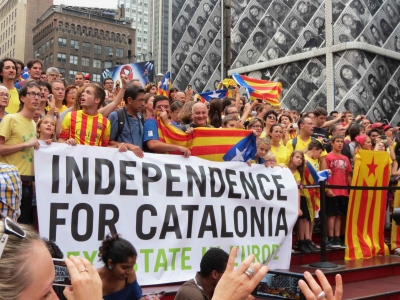Written while anxiously waiting to see how the situation in Spain (and Brussels) will unfold, and reflecting upon how we got here in the first place…
After 3 years of explaining to people the complex situation in Catalonia and why I feel a strong sense of empathy and support towards their calls for independence, it seems the issue has finally reached international audiences. Unfortunately, it took police brutality against their own citizens for the world to sit up and take notice.
The media often refers to the economic situation in Spain as the principle motivation for the Catalans wanting independence. This is not just an oversimplification, but in the case of most Catalans, it would be seen as an inaccuracy. It is not, and never has been, about the money (not fully, anyway). The tension and mistrust between Spain and Catalonia has existed since the regions of Spain were united under one king in the 15th century, much to the disdain of the Catalans who had already been an established nation for centuries prior.
The history of Catalonia and its relationship with Spain is complicated to say the least, and best saved for another day. However, it is important to recognize that their foundations were laid separately, their languages and cultures developed independently of one another (Catalans are quick to tell you their language came first!), and that while some people consider themselves dual nationals of both countries, there are many who feel strictly Catalan and not Spanish, and vice versa.
This history is critical to understanding that the current ‘crisis’ cannot be explained away with numbers. Notably, Catalonia does pay more into Spain in taxes than it receives in benefits, and represents a fifth of the Spanish economy without receiving the same support as regions like Andalucía, but the long-standing disagreement between the region and its ruling state didn’t originate during the most recent financial crisis, as many would suggest. Rather, the economic situation emphasises something many Catalans have always felt – that they are not respected by the Spanish state, or valued as much as their regional counterparts.
Examples of this are plentiful, but a simple yet striking one is that most motorways in Spain do not have tolls – yet, nearly all in Catalonia do. Consult any travel website about driving in Spain, and you will most likely encounter a specific warning about the tolls in Catalonia. These inequalities add up, and all form part of the collective feeling amongst Catalans that the region is bullied by the Spanish state. The Spanish government in contrast has often played the victim, and has been quick to criticize Catalan separatists – the ‘rebels’, as they see it.
When you consider the historical context and the brutal dictatorship that only ended 40 years ago, after Francisco Franco’s death, it’s not too difficult to empathise with the separatists, or, in my case, to side with them.
In 2014 I lived in Barcelona for six months, working in the press office of the Catalan National Assembly under the leadership of now President of Catalan Parliament Carme Forcadell. Carme and the others I was lucky enough to work with and meet during my stay in Catalonia taught me about their culture, their language, and their history. They also told me about their experiences with Francoism, their or their family members’ experiences fleeing the country or hiding out during the regime, using different names to the Catalan ones given them at birth.
As evidenced by this the Catalans have not forgotten their recent past, and are (quite understandably) fervently fighting to avoid repeating it. Whilst some on the outside might see their protests, voting against the state’s wishes, and strikes as a means of furthering a rebellious agenda, the Catalans see it as a means of escaping repression.
There are plenty of economic and operational reasons for Catalans to support independence, but these are not usually the first things they mention if you speak to a separatist and ask them why they want to be independent. The emotional repercussions of living through or immediately after a repressive dictatorship, and subsequently feeling that your unique culture and national identity are yet again being threatened, is enough alone to push Catalans towards independence. The economic context, and further the perceived disdain for Catalonia coming from Madrid (and by association the rest of Spain) is the cherry on top of the secessionist sundae.
By not giving anyone in Catalonia a right to decide their future, Spain has deprived them of a chance at debate and self-determination. The refusal here is a means by which Spain is pushing Catalonia further away – not just ‘Catalans’ or ‘separatists’ – but everyone living in Catalonia. When they voted on independence on October 1st, and the Spanish police were violent towards citizens – including the elderly, and despite the fact the movement is and has always been entirely non-violent – more people were mobilised.
In trying to curtail Catalan independence through coercion, Spain has brought more people out onto the streets, has made more people pay attention to their cause. Being told ‘no’ over and over again, believe it or not, often makes those being told ‘no’ work harder for what it is they want to achieve. This denial of their rights makes it quite obvious to see why the situation in Catalonia has unfolded as it has. Now, we wait to see what happens next!




